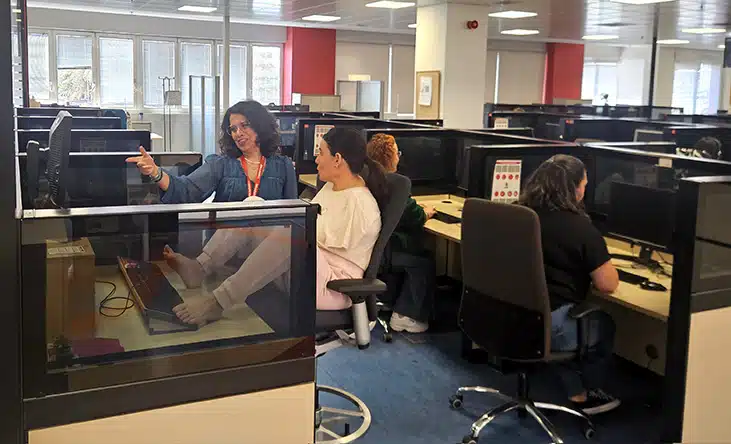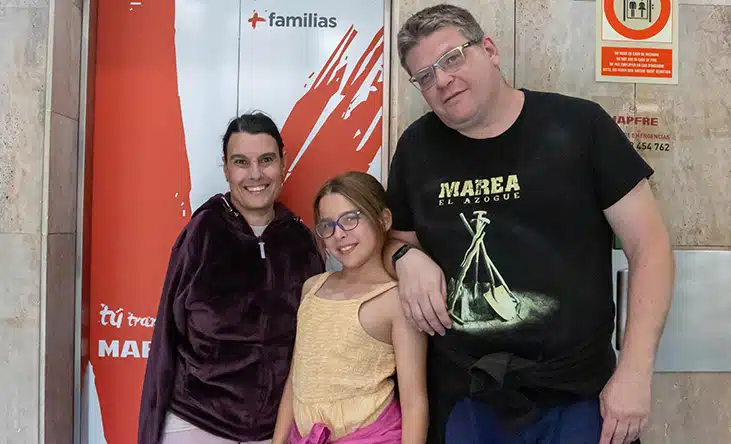What’s your personal story?
My mother had to leave me at an orphanage when I was a baby. Everyone there had arms and hands, but I just copied what the other kids did. If someone drank from their bottle with their hands, I’d do it with my feet. If I wanted a doll from the crib next to me, I’d stretch out my little legs and slip them between the bars to grab it. I learned everything through imitation from the very beginning. I’ve never set limits for myself—if others could do it, so could I. Doctors always remarked on how well I’d adapted.
Adolescence isn’t easy for anyone, but I never felt like I had fewer rights or less drive than anyone else. When I was 16, I was adopted by a really big family: they already had five younger kids, and then two more came along! So I suddenly had brothers and sisters, and I learned a lot from them too about what it means to be an older sister. I bathed them, taught them how to make their beds, helped them with their homework…
Before Mapfre, I was a librarian. But since I’m good with people and phone calls, I thought the job at the company’s call center in the Canary Islands was a great fit when they offered it to me.

What’s your daily life like?
My life isn’t all that different from anyone else’s. I make breakfast for my nine-year-old daughter, shower and get dressed by myself, catch the bus, and go to work. I just do everything with my feet. When I get to work every day, I take off my shoes and I'm ready to go. The only things I need are a higher chair and a step stool to help me get seated, nothing else. I set myself a little challenge every day, like trying to get to the bathroom faster. So that’s how I keep moving forward.
Of course, I live in a home adapted to my needs, which lets me live a normal life and raise my daughter just like any other mom.
The hardest part is dealing with people who don’t respect or understand individual differences, or who doubt what I’m capable of. But I always remind myself: if the world doesn’t stop for you, you can’t stop for the world either.
Who has been your biggest support?
When I was a kid, my friends at the orphanage were my biggest support. They always treated me just like everyone else—we shared the same worries and grew up in much the same way.
Now, my biggest supports are my husband and my coworkers. I know I can count on them for anything I need. If we go to an event, for example, one of my coworkers is keeping an eye on me, just in case I want something to eat or drink. But they always wait for me to ask, and they never make me feel dependent, quite the opposite. I feel really supported.
“I can honestly say I feel fulfilled in every part of my life”
What’s your experience working at Mapfre like?
From day one at Mapfre, I found myself in a work environment completely adapted to my situation. As I mentioned, I’ve had amazing support from both my colleagues and managers. They built a wooden structure so my computer screen could be safely positioned right at my eye level. They also installed the building entrance card reader at a height that I can reach, so I can get in without having to ask anyone for help. Other colleagues with different needs benefit from these adaptations too. It helps us feel more independent.
They were there for me when I was pregnant, too. I had some difficulties getting pregnant, but thanks to the treatments I received through Mapfre, we finally succeeded. From the very beginning, they encouraged me and stood by me through the whole process. My daughter arrived just when we least expected it, and it made us incredibly happy. They also helped me adapt my home to have the best conditions for raising her in a safe environment. When she was born, the house was already fully prepared for her.

What do you think is society's pending task in terms of inclusion?
I think there’s still a long way to go in adapting our cities and physical spaces. Infrastructure isn’t always accessible. We have to remember that not everyone’s situation is the same. Falling down is very different for me than it is for someone who has arms, for example. It's another one of the things I really appreciate about working at Mapfre. Every space around me is designed to never be a problem or limitation for me or my colleagues with different needs.